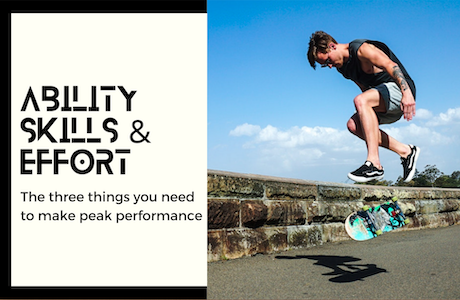James Arthur Lovell, Jr., one of the first American astronauts to fly and orbit the moon once said, “Be thankful for problems, if they were less difficult, someone with less ability might have your job”. He simply means that sometimes your ability may determine what kind of job you’ll be qualified to do. The more job difficulty is, the rare the ability required to execute it. And this article is going to argue that in order to make peak performance in any job, you need - ability, skills, and effort.
In today’s workplace, the popular career advice is - to follow your passions no matter what. Well, that is OK, but I think we should apply this advice with caution. In my opinion, I think the best advice should be - to follow your talent first then make it your passion. To defend my argument, let’s take, for example, the following scenario. Let us use the same lens to magnify this scenario and look again honestly inside it. Let’s suppose that you are a university professor and you’ve been asked to recommend one candidate among the two to become a practicing medical doctor. Whom one would you recommend from the following two candidates’ profiles?
The first candidate has a deep passion for piano music but also he or she is intelligent and has demonstrated to possess a very high IQ. He or she is also talented in problem-solving ability.
The second candidate has a deep passion for neurosurgery but, unfortunately, he or she is a little bit mediocre and has shown to possess a below-average IQ. He or she has also shown to be a talented comedian.
The question is: who among those two candidates would you endorse to follow his or her passion? Would you really recommend the second candidate to practice brain surgery simply because he or she is passionate about it? It’s my hope that you’ll agree with me that following your talent over your passion is the best advice.
Perhaps - you might argue that - becoming a qualified neurosurgeon is not a matter of choosing people randomly but it involves long training and graduating with passing marks. Yes, but here we assume a really mediocre candidate who has no ability to score above the passing mark but inside him/her has a deep-seated passion for neurosurgeon practice.
There are others who are lucky and multi-talented people. I would say for those people, they can choose to follow their passion among their talents. They're already multi-talented so they can choose which talent they're passionate about. Following their passion among their talents make sense to them.
In my personal research, I concluded that in order to make peak performance at work, you basically need only three things: ability, skills, and effort. And those three things need to be executed in the following sequence: first, assess your ability, second get the required skills, and third, attempt to succeed by applying all your efforts.
In the simplest words, we could define the ability as the power to do something. We define skill as the ability to use your ability to do something competently. While an effort is a serious attempt to do something.
If your personal aim is to pursue excellence and perform wonders at work, then the first thing you need to do is to assess your ability.
"In the simplest words, we could define ability as the power to do something. We define skill as the ability to use your ability to do something competently, while an effort is a serious attempt to do something."
Assessing Your Ability:
Generally speaking, assessing your ability depends on your in-born qualities and what kind of job are you doing? But one way to assess your ability is to seek the advice of career advisors. You can also find a way to do a personal SWOT analysis. Check for both your strength and opportunities against the threats and weaknesses to avoid bias and also get the full picture. If you are smart and you do it honestly, you can be confident to apply that evaluation of yourself to capitalize on your outstanding abilities. Because you can see in your heart, then the truth is that the heart reflects the actual personality (Proverb 27:19).
Others could get insight on this by simply listing those abilities they think they possess based on their real-life experience. And in the case of Christian believers, they need not be afraid because they have a choice to seek Divine Guidance. Christianity teaches that the Holy Spirit gifts each person for the greater benefit of the entire church (1Corinthiants 12:4-11). It is your duty to discover or pray for your gifts. To some extent, life may be similar to forced military duty with a scenario of - do or die. This is because, in the grandstand of things, things are already at stake.
It is very important to do a kind of job which you know for sure that you have got the necessary abilities to do that job very well. Contrary to that, things might be like how the following illustration is going to explain. For the sake of this illustration, let's take the example of a blind person. We both know, to drive a car safely in the city, you must have the ability to see through the windshield while you’re driving on the road unless it's a self-driving car. Now, what do you think will happen if that blind person is allowed to drive a manual car at high speed? Obviously, a collision is imminent. The danger here is that a blind person does not have the ability to see and is therefore disqualified to drive on his/her own on the roads.
Believe it or not, most people who have ignored the process of assessing their abilities first are doing exactly the same as that blind person above. And they are doing it by driving at a top speed through their daily struggle, as evidenced by talent misappropriation and poor work performance. In other words, their peak performance is below the general average performance.
There is an ongoing debate of whether talented people are born or are made. Today let's spare that discussion for another day but let it be enough to say that it is possible to fill the gap in your ability’s shortcoming. One way to overcome that is to acquire the required skills by doing what it takes.
Working on Your Skills:
The good news about skills is that it is acquired through a certain process. You can gain a new skill or develop or polish a current one through training, tutorials, or on-the-job practice in real life.
Similarly, to make general peak performance at your work, do not underestimate the importance of learning the required identified job skills.
The following story illustrates the point on how skills help to get things done more efficiently.
One day in a certain company, a piece of certain factory machinery went down and caused a machinery malfunction. The factory manager quickly called an engineer who was skilled in fixing factory machines with malfunction like that. On arriving at the site, the engineer started by asking probing questions so that he could understand the nature of the problem that led to the breakdown. After that, he inspected the factory machinery. Then he went on to change just one piece of nut situated in the middle of the factory machinery plant. Wow, when the factory machine was switched on, the factory machine started to work again and was up and running,
Subsequently, the engineer billed the factory manager with a $1000 invoice. The factory manager protested claiming that he could get that one nut from the nearest hardware store for less than $10 then why the bill is so ridiculously high? The engineer smiled on his face and together with a cool composure replied, “The itemized breakdown of that invoice is: $10 is for the nut and $990 is for the labor charge required to know which nut to replace and deal with!”.
To have the ability and the skills is half the story, you need to make efforts in order to make peak performance at your work.
Making Effort to Make General Peak Performance at Work:
You have the abilities and you have the required skills then you should add your personal effort to succeed. The memorable quote of social commentator, William Penn Adair Rogers reminds us that “Even if you are on the right track, you'll get run over if you just sit there”.
Once you have identified your abilities and you have learned the required skills then you must make a serious personal effort to make peak performance and succeed at your work. No more, no less - just that.
Conversely, there are many people who make mistakes of thinking that effort itself can accomplish almost anything. They say that all you ever need to succeed and make peak performance is to work very, very hard.
My research findings have revealed that applying effort alone is not enough without having the other two things in place: ability and skills.
To make this argument clear, let's take a look at the following scenario. Suppose you do not have the abilities and the skills to fly or land an airplane. Suppose again that you happen to be a passenger in one of the flying airplanes. Assume that while you were 35,000 feet above sea level suddenly all your pilots collapsed and they have asked you to assist to land the airplane safely on the ground. Within those few minutes before the airplane explodes, how much effort do you think will be enough to make you land the airplane safely like a qualified commando pilot?
It’s from this point of view that I insist you need to assess your abilities first, get the skills and finally add personal effort to do the extraordinary by making a peak performance.
Making a truly serious effort is going the extra mile. (Matthew 5:41).
Most self-help publications’ ideas revolve around the core issue of putting into flame your inner abilities to exert unwavering efforts. But in a nutshell, the secret is to make you, give it your ‘all’. Fight to win. Work to excel. And be wise.
In colleges and in classrooms, we learned the perfect education models, and sometimes some other varying factors were held constant for the sake of proving a working theory or model. But the fact of the matter is - in real life all factors vary, and vary at varying rates. The hell is broken loose all the time. So, to navigate successfully and make the general peak performance at your work, you need three things - ability, skills, and a lot of effort.
Here's a talk presented by Angela Duckworth at Lavin Agency Speakers Bureau, claiming that: effort matters more than talents.
















